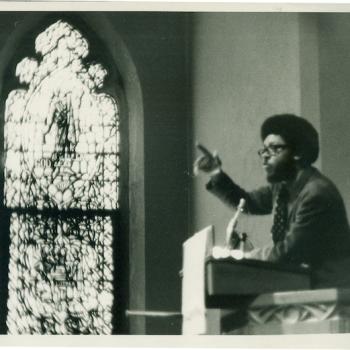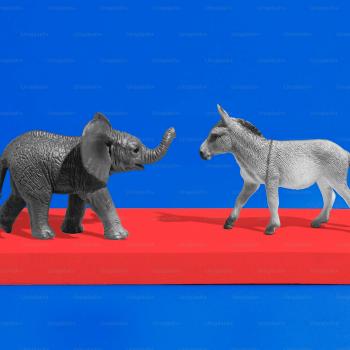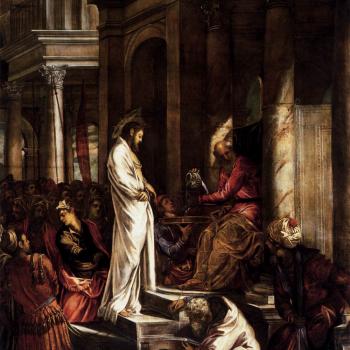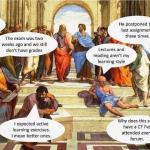One pressing concern among postliberal theologians is the perverting nature of political arrangements. The terms of the world, in other words, eclipse the transcendence of Christian theology. It entraps Christian witness in a prism that does not refract but hides the light of Christ from the world. Partisanship is one such mode of worldly engagement.
Commentators often deride party politics, and rightly so. There is already a wealth of literature on political and affective polarization in the US. This polarization grafts along party lines. As Lilliana Mason writes in Uncivil Disagreement: How Politics Became Our Identity, “[p]artisanship can now be thought of as a mega-identity.” Partisans dress, eat, shop, talk, and think the same.
And as Yanna Krupnikov and John Barry Ryan show in The Other Divide: Polarization and Disengagement in American Politics, polarization introduces another axis of division. That is, as more extreme Americans pull the parties further apart, more moderate Americans sit politics out as they feel more politically homeless in the US two-party system. Indeed, 20 million registered voters did not vote at all in the 2024 presidential election. And another nearly 3 million voters voted for someone other than President Donald Trump or former Vice President Kamala Harris.
Against this backdrop, partisan theologies fester, placing first the importance of the party line and reshaping Christianity in its favor. In the contemporary American context, is it possible to practice political theology beyond and above the confines of partisanship?
Why Partisan Theologies Exist
There are reasons why politically inclined theologians risk turning theology into a partisan project. Mason’s work has demonstrated how America’s two major parties have surpassed the purely political, and have infused American culture.
Party politics, and partisanship (understood as the commitment to a party) by extension therefore serve as the defaults for any politically engaged theology. And this engagement need not be self-conscious. The split between fundamentalism and modernism detailed by George Marsden in Understanding Fundamentalism and Evangelicalism transposed Protestantism’s deepest divide onto the separation between American conservatism/liberalism.
Therefore, partisanship is in the very air that theologians breathe. Whether one views divine justice as punitive or rehabilitative; the Kingdom as imminent or immanent; humans as pessimistically depraved or hopefully predisposed toward good; government as ameliorative or restorative, is very much an indicator of one’s partisan orientation. Even the many forms of so-called Third Wayism, which seeks to save Christian theology from the throes of US party politics, tends to push partisanship while claiming partisan transcendence.
Balancing Transcendence and Incarnation
The very problematic of partisanship and political theology is inherent to political theology itself. In a book I have discussed before, Politics, Religion and History, Raymond Plant describes this problematic well:
Theology might be thought of as a discipline which seeks to arrive at some general truths about the nature of God and God’s action in the world. On the other hand, political communities, their beliefs and values are highly specific and particular. The nature of God might be thought (at least in classical theism) to be timeless and unchanging, whereas politics is always about the ways of life of particular communities at particular times and in particular places.
In other words, theology itself (traditionally conceived) concerns the universal, the timeless, the transcendent. Politics, on the other hand, is about the specific, the temporal, the particular. One can think about the US party system as part of that political world of particularity. US party politics is part of American life. To inhabit America is to breathe the air of parties and polarization.
Any theological work in the American context, then, is inevitably shaped by party politics. Yet, as witnesses to a Kingdom not of this world, and as children of a God free from partisan constraints and loyalties, the task of the political theologian must be more than simply communicating theology to serve a partisan agenda. So too must the task be more than simply pointing out that theology transcends ideological divides. In other words, there must be an emphasis on the otherworldliness and eternality of theology, yet also an emphasis on how theology speaks to political contexts.
Contours of an Approach
For much of my life, I have been shaped by the winds of partisanship. And all around me, I see members of the politically inclined theological class reducing the Gospel to political programs, self consciously or not. It has been only recently that I believe I have struck upon the beginnings of an approach to political theology that can at once speak to partisan realities while also refusing to be reduced to partisan terms.
1. Rethinking Christ’s Relationship to Partisanship
In his 1951 Christ and Culture, Niebuhr surveyed the different relations that Christ is said to have with culture. Following the Polish ethnologist Bronislaw Malinowski, Niebuhr describes culture as a “social heritage” that individuals share in a given society. Partisanship is part of that social heritage of America.
We can think of the possibilities of Christ’s relationship to party politics using Niebuhr’s typology. Christ could be against party politics, as Third Way theologians would have it. Christ could be of, above, or in paradoxical relationship with party politics. Or, Christ transforms party politics. These modes have their strengths and weaknesses.
In deeper conversation with each of these fives types, I do not think any singular one is fruitful for this context. Christ against partisanship leads to impracticable cynicism, and Christ of party politics simply affirms partisan dogmatism as a test of true faith. Christ above partisanship proposes, in Thomistic fashion, that the dictates of party lines prepare the way for the fullness of Christ’s kingship. What parties say about authority, justice, and social cohesion all imperfectly anticipate the king of kings. This is a powerful theological insight. But the path forward is not quite clear. And Christ and partisanship in paradox seems to separate the spiritual and the political in an unhelpful way. Finally, Christ transforming partisanship supposes that the Gospel changes not only individuals but society as a whole. Yet, this view is perhaps overly optimistic when it comes to US party politics.
2. Changing the Terms of Party Politics
I argue that a synthesis between Christ above culture and Christ transforming culture seems actionable.
Christ above culture helps us to view party dictates without cynical disdain. There is promise in parties as conduits of the people. And Christ transforming culture gives some sort of direction for living between the now of a broken party system and the not-yet of the Kingdom.
A political theology which speaks to party politics without being reduced to partisanship first accepts the promise that party politics holds. Parties enable mass politics by providing actionable platforms for people who otherwise lack the resources to make political impacts. Parties also enable what political theorists call “legitimate opposition.” Rather than reducing politics to a violent competition, citizens can try their ideas against each other in a peaceful, albeit agonistic, way.
Starting from these seeds of truth and goodness, political theologians can think about how to engage the Church in ways that excavate the best of what parties have on offer. But Christians must also embody political witness in other ways. Social movements, civil associations (among neighbors, renters), and voluntarism are all important, as we will discuss soon.
3. Engaging the Local
The final contour of this approach is engaging local problems and leveraging local advantages. Even the very fabric of America is designed to address local politics. Yet, politics has become nationalized. As Jamie L. Carson, Joel Sievert, and Ryan D. Williamson point out in Nationalized Politics: Evaluating Electoral Politics Across Time, the national triumphed over the local in 2016. They write:
During the 2016 elections, every state won by Hillary Clinton elected a Democratic senator, while every state won by Donald Trump elected a senator from the Republican Party. . . . The 2020 elections continued this trend, as every state except Maine supported co-partisan Senate and presidential candidates.
Indeed, Petter Törnberg (who we have discussed before) points out that the House and Senate were designed not to appease two national parties. They were designed to meet the needs of “the nation’s districts and states, allowing regional interests to moderate partisan excesses.”
Partisan influencers are telling Americans that no matter where they live, the party has the answers. But contrary to Immanuel Kant’s argument in the Perpetual Peace, good politics is not accomplished through one-size-fits-all strategies. What works for one city does not work for another. What is good for urban Americans is not always good for rural Americans. Nationalized partisanship has eclipsed this basic reality: good politics is contextual.
This is why social movements, civil associations, volunteering, nonprofit work, and peaceful demonstrations are key. These are ways that Americans can come together across partisan lines, meeting to address local issues that affect them all. It is not the kind of glamorous national politics which makes the news. But it is the kind of concrete, drawn-out politics which makes genuine difference.
Political Theology After Partisanship
Political theology must overcome the terms of partisanship. Yet, it need not completely reject partisanship altogether.
Political theologians must strike a delicate balance between the transcendent (and transformative) nature of theology and the real-world particularities of political life. Re-evaluating party politics and reorienting ourselves towards social engagement can accomplish this.
Christians must recover the good aspects of party politics. Party politics enable mass political participation and can stabilize society through providing legitimate opposition.
Yet, parties should engage local issues. Thus, governing structures like Congress can accomplish the local ends that they were designed for. New Mexican Republicans should be different from Georgian Republicans. Californian Democrats should be different from Floridan Democrats. Party lines should not be the same across the nation. Rather, parties should adapt to the needs of local populations.
And above this reassessment of party politics, political theologians must encourage the Church to think past parties as modes of political engagement. It is urgently important, as we have discussed before, that Christians practice peacemaking by bringing together people who do not share the same “mega-identity.” This can happen at the local level, addressing local issues.
Through this avenue, it is possible to balance the transcendent with the incarnational. This is how we can be the Body of Christ without sacrificing Christianity on the altars of partisanship.












